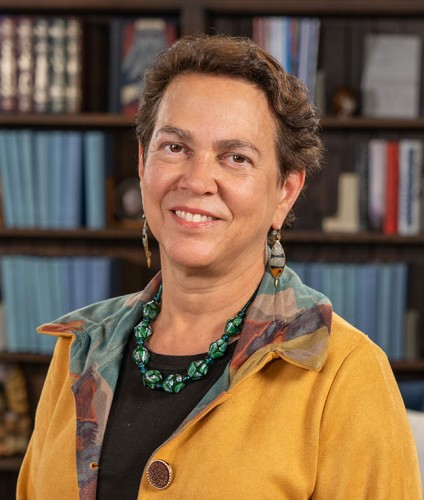
Affiliated Departments & Programs
Wendy Singer is an historian of South Asia, whose research focuses, primarily, on the twentieth century. Currently serving as associate provost, her goals are to support faculty in advancing their research and teaching at every stage of their careers and to promote Kenyon’s aims to further globalize the campus and integrate interdisciplinary studies fully into the curriculum.
She is committed to Kenyon’s international partnerships, for example, through the Humanities across Borders Consortium and our joint technical writing workshops at the Indian Institute of Technology Madras. The latter is a collaborative effort with Professor Chris Gillen in the Biology Department at Kenyon and Professors Sudarsan Padmanabhan and Sriram Kumar at IITM.
As a scholar of modern India, her research connects the history of the anti-colonial movements to the development of the post-independence state, Some of these ideas are addressed in the recent article, (2021) "Women in the State: Elected Women and the Challenge of Indian Politics (1957–62)," South Asia: Journal of South Asian Studies, DOI: 10.1080/00856401.2021.1890257,. Relatedly, she is writing a monograph on the history of "Reservations," India policy, somewhat like affirmative action, that provides designated seats in Parliament, state legislatures and other institutions for under-represented groups. The research for this book was sponsored by a Fulbright-Nehru Senior Research Grant in 2012.
Some of Singer’s earlier work lays the groundwork for this scholarly path. For example, an essay, about reservations and elections, “A Seat at the Table,” appeared in the Election Law Journal in 2012 and the book, A Constituency Suitable for Ladies and other Social Histories of Indian Elections, describes the culture of election process that imagined different constituencies and how to address their needs. And at the heart of all of her work is her commitment to the social history of Indian citizens — women and men of different classes — their political mobilization and their everyday lives. This began with her first book, "Creating Histories: Oral Narratives and the Politics of History-Making," about peasant movements in the state of Bihar in the 1930s.
Other projects have come about along the way. For example, in response to the need for a post 1947 Indian history textbook, Singer published "Independent India: 1947-2000," available from Routledge Press. And she had an unusual opportunity to meet with and interview the Dalai Lama in association with a project on the Tibetan Government-in-Exile. Results of that interview, sponsored by a Kenyon grant from the National Endowment for Humanities and the Ohio Humanities Council, include “Post Colonial Dharamsala,” in the journal Salt and “The Dalai Lama’s Many Tibetan Landscapes” in the Kenyon Review.
Awards
2021-2022 Kenyon's Distinguished Faculty Service Award
2018 Faculty Academic Advising Award
Areas of Expertise
History of India and South Asia, Indian politics, globalization and migration, transnational communities.
Education
1988 — Doctor of Philosophy from Univ Virginia
1984 — Master of Arts from Univ Virginia
1982 — Bachelor of Arts from Univ Virginia